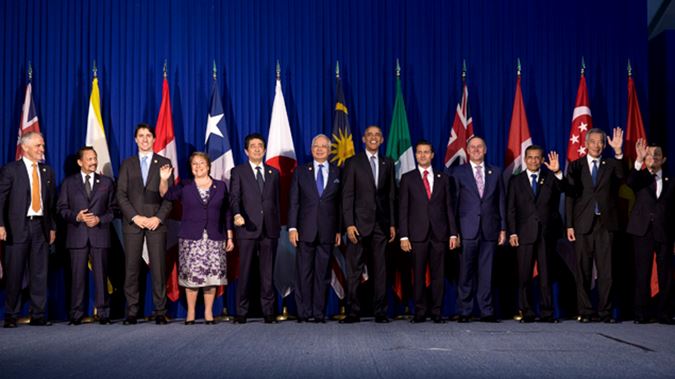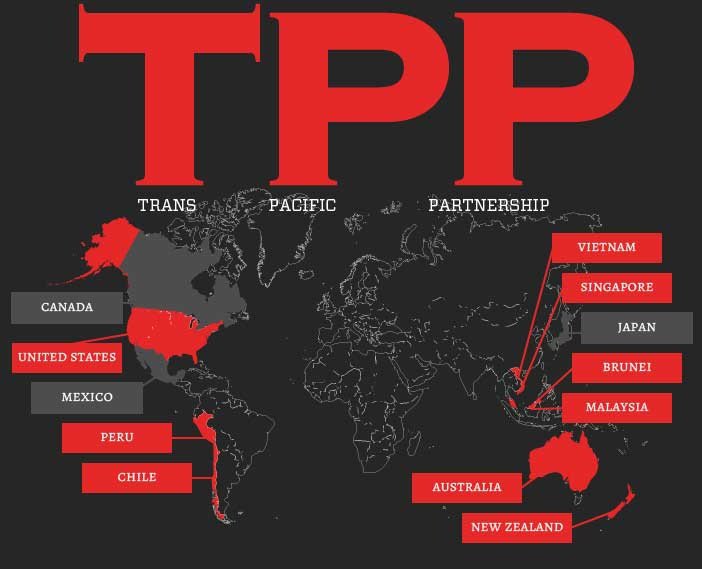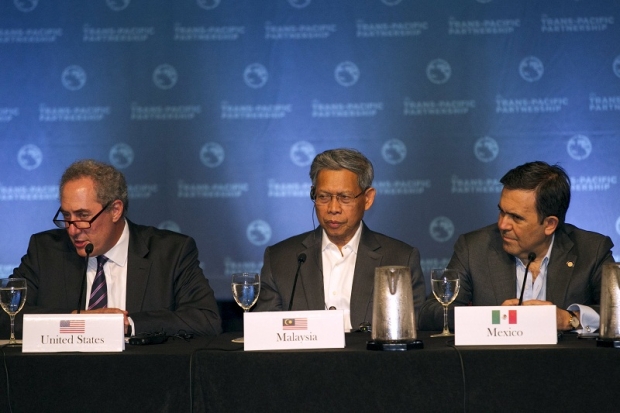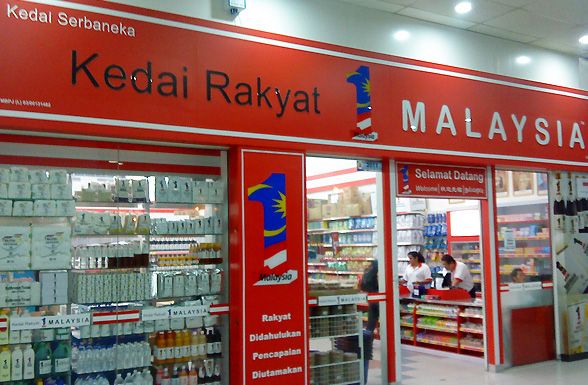How Will TPPA Change Our Lives Now That Malaysia Has Signed The Deal?
The controversial deal was signed yesterday, 4 February 2016.
After almost a decade long worth of discussions and negotiations, the Trans-Pacific Partnership Agreement (TPPA) was finally signed today, 4 February, by leaders from 12 participating nations
Known to be one of the biggest trade agreements to have ever been crafted, TPPA was first introduced back in 2006 by the United States, with extensive trade laws that are meant to create a more diversified economical environment.
The 12 countries that signed the agreement are, Australia, Brunei, Canada, Chile, Japan, Malaysia, Mexico, New Zealand, Peru, Singapore, the United States and Vietnam.
Despite how eager American leaders were about this trade pact that could easily boost their exports, job opportunities, and trade industry, people from most of the participating countries protested heavily against it.
The protesters raised concerns over the nature of the agreement that was kept very confidential till the very last minute. When revealed, many challenged the stringent laws that could potentially bring about a great deal of change the trade and economy of the participating countries.
Despite the concerns raised about this new trade pact, local leaders have been repeatedly assuring Malaysians that TPPA can help us penetrate into the booming economies of the participating countries
International Trade and Industry Minister Datuk Seri Mustapa Mohamed signed the comprehensive 21st century pact for Malaysia that represents nearly 40 per cent of global gross domestic product worth US$30 trillion.
The TPPA is aimed at promoting economic integration to liberalise trade and investment as well as spur economic growth and social benefits.
More than 90 per cent of the economic gains will be attributable to lower non-tariff measures. It is also expected to create new opportunities for workers and businesses, contribute to raising living standards of 800 million people, benefit consumers, reduce poverty and promote sustainable growth.
So, if TPPA is beneficial to the economies of the these countries, why the uproar over it?
The Trans-Pacific Partnership Agreement is an agreement that covers a extensive range of policies on international trade that would give leeway for all the countries involved to boost their trade industry and exports to increase the wealth of their respective economies.
TPPA is a complex agreement that has up to 29 lengthy chapters worth of nitty-gritty policies on exports, imports and copyright laws among many other free trade related issues
Some of the main clauses in this agreement that stood out were; policies related to state-owned enterprises, small businesses, and intellectual property rights.
What is it about these policies that has gotten the masses so worried about this trade agreement?
The Malaysian Ministry of International Trade and Industry (MITI), Unit Peneraju Agenda Bumiputera along with Pricewaterhouse Coopers (PwC) has conducted an analysis on all the potential impacts of the newly-signed TPP agreement on the local economy and other sectors involved.
To help you better understand the issue that has been brewing about TPPA's ironclad laws, we have broken down the main issues into different parts on how these industries will work now that we are a TPP nation.
State-Owned Enterprises, Bumiputera Companies and Small Medium Enterprises (SME):
When the details of TPPA was first revealed late last year, people were concerned about how the small businesses in the country would survive, with TPPA seeking to decrease the costs of setting up multinational and international corporations in all the participating countries.
Most people were wondering if local products and services could survive the high level competition from the international corporations. Malaysia is very much a developing country, still working our way up to better promote and sell our services internationally.
When companies from major first world nations like the United States, Canada or New Zealand bring in their products that might be better established and known, our growing business might struggle to compete with them.
A simple local example of this situation: In order to cultivate the businesses of local bakers in Sarawak, they do not import bread products from one of Malaysia's main baker, Gardenia Bakeries (KL) Sdn Bhd.
What about Bumiputera companies?
Any company that wants to be listed as a Bumiputera enterprise must at least have 30% Bumiputera ownership to satisfy the listing requirements.
As of now, a number of government-tendered projects require the organisations submitting tenders to be Bumiputera-owned, to help struggling Malays develop their businesses under the New Economic Policy introduced in the 1970s.
With the implementation of TPPA, with their freer trade laws, concerns were raised on how Bumiputera businesses will continue to thrive with these privileges.
How will TPPA change the way our SMEs and Bumiputera companies function?
After a great deal of negotiations, the Malaysian government signed a number of safeguards to protect the local small businesses and Bumiputera enterprises.
Thanks to those, the government maintains the flexibility to allocate 30% of government procurement to Bumiputera contractors in construction services that are open to TPPA nations.
As for state-owned enterprises, they are allowed to give preferences to Bumiputera and SMEs up to 40% of their annual budgeted purchases.
According to the analysis, SMEs and Bumiputera businesses that are still highly protected by the government are more likely to reap positive benefits from the cross-border trade.
But, there is catch. The whole point of TPPA is that it seeks to achieve equality in trade across its participating countries. So, state-owned enterprises might still face some amount of difficulty in trying to support local enterprises.
Will TPPA's Intellectual Property laws affect the rising cost of medicine and pharmaceutical drugs?
Another major issue that was brought up was how TPPA's intellectual property rights chapter would potentially hinder the availability of generic medicine, that is widely used in many developing countries thanks to its affordability.
Intellectual property rights is defined as any creation (artistic works, inventions, names, symbols, etc.) that are protected and assigned to designated owners by the law. Examples of intellectual property rights are trademarks, patents, trade secrets and copyrights.
TPPA would give pharmaceutical companies up to eight of years of protection term for all newly produced drugs. This move would stop any pharmaceutical organisation from making generic drugs based on the newly discovered ones. America was initially pushing for a 12-year protection term but eventually agreed with eight instead.
What about Internet freedom?
With the Internet dominating a major aspect of the world, many were concerned about how TPPA's ironclad laws would affect the way we use the internet.
The TPP imposes similar restrictions to SOPA (The Stop Online Piracy Act) and PIPA (Protect IP Act). Currently, if you download a recipe from a website and print it, it’s free. But if the TPP passes, then you may be assessed a fine of up to $10,000 for violating copyright laws. The TPP opens the door to set up policies that:
(A) Ban you from Internet use if you violate copyright, which will be set at 120 years by the TPP.
(B) Require you to have your blogs or content filtered by an Internet intermediary for possible copyright infringement.
(C) Block websites if they might be infringing on copyright.
(D) Force Internet Service Providers to hand over your identity should you infringe on someone’s copyright.
However, the government of these countries still have two years to ratify the agreement before it comes into effect in 2018
Malaysia joined the TPPA in the third round of negotiations in October 2010.
The country’s inclusion in the trade pact is expected to boost Malaysia’s GDP by US$107bil (RM449.5bil) to US$211bil (RM886.5bil) from 2018 to 2027.
Investments are projected to increase by US$136bil (RM571bil) to US$239bil (RM1 trillion) over the same period, largely due to higher investment growth in textiles, construction and distributive trade.
The trade pact is also expected to create new opportunities for workers and businesses, contribute to raising living standards of 800 million people, benefit consumers, reduce poverty and promote sustainable growth.






